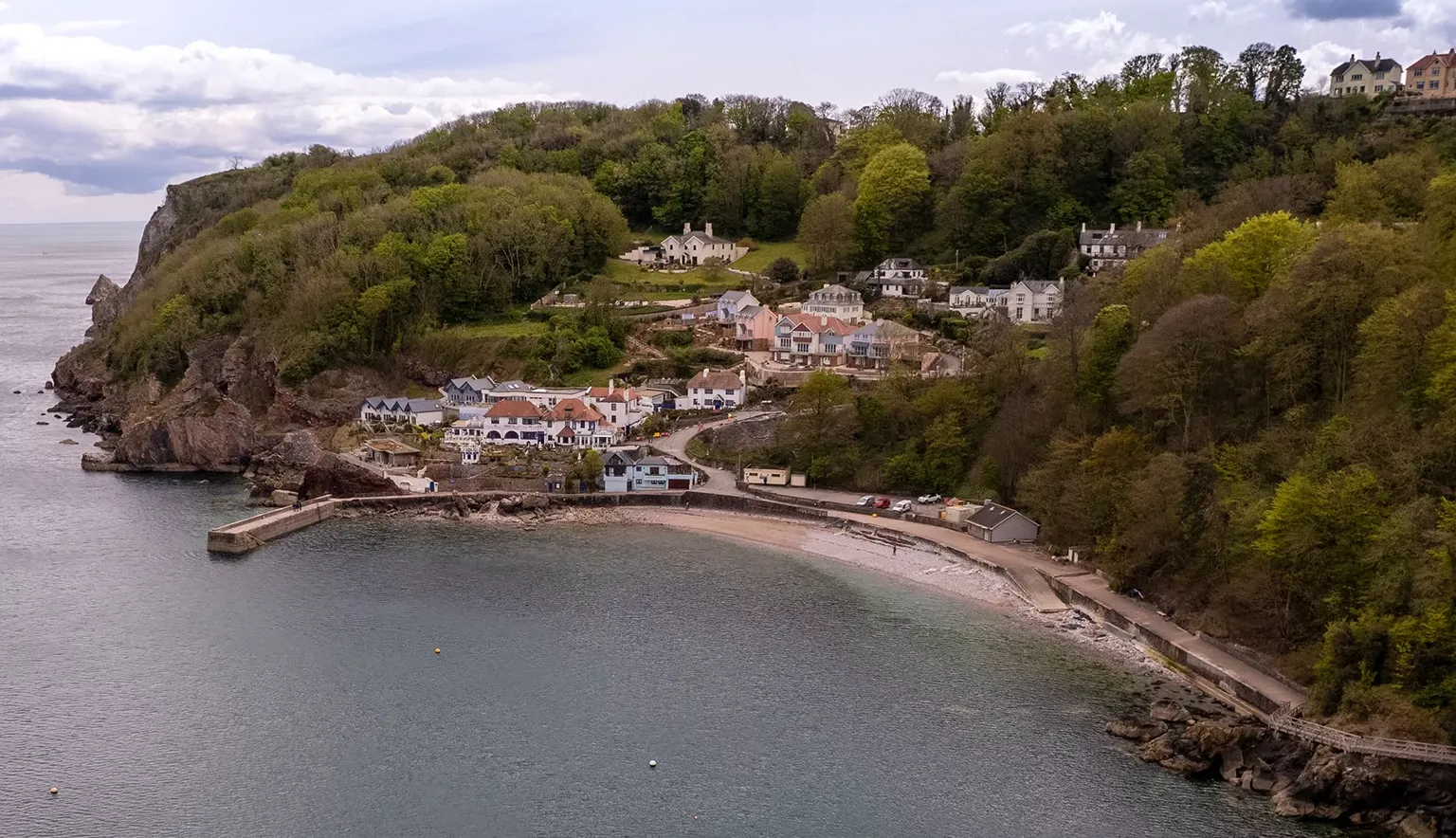From jaw-dropping coastlines to swashbuckling tales of smuggling and scandal, we explore the hidden wonders of the English Riviera and South Devon.
SOUTH DEVON
Home to the Queen of Crime herself and the illicit liaisons of famous playwright Oscar Wilde, South Devon is a land rich with intrigue. Its dramatic coastline of crumbling cliffs and secluded coves holds rich legacies of smuggling and seafaring, and before the madding crowds of summer arrive, this small portion of England is the region’s best-kept secret.
Before our journey takes us further north to the horseshoe-shaped bay of the English Riviera, a sense of seclusion is felt keenly in the small hamlet of Dittisham, a quiet riverside haven of winding lanes and old stone cottages packed cheek-by-jowl sloping towards the water’s edge. As evening falls, the bubblegum pink Ferry Boat Inn, known to its loyal crowd of locals as the ‘FBI’, delivers the comforting pub ware of vinegar-drenched scampi and chips overlooking the placid waters of the River Dart. Although shrouded in darkness, across the water stands the whitewashed Georgian mansion of Greenway, the holiday home of Devonshire resident and prolific author, Agatha Christie. From the riverbank, the Greenway ferry promises to deliver you to the sloping, manicured lawns of the self-proclaimed ‘dream home’ of the best-selling novelist of all time, where she would come to escape the tales of murder, mystery and scandal that earnt her fame.
Just one mile from the river’s edge, I find a free coupon for the Greenway ferry as a welcome gift in the hamper left at our accommodation that night – a shepherd’s hut hidden away amongst a tree-shrouded valley. Although joined by four other huts, an authentic American airstream, and four vast treehouses towering amongst the woodland above us, the immediate peace of the valley justifies the moniker of Dittisham Hideaway. With the natural walls of the glade dampening all noise, save for the trill of birdsong and the crackle of our fire pit, we sip the token Devon sloe gin and toast marshmallows while loading up the wood-fired hot tub with a generous supply of logs under an inky canvas of sky littered with stars.
The bustle of nearby Dartmouth the following morning comes as a shock after a night in the Hideaway, where we explore the castle perched dramatically on its promontory as the centuries-old guardian of the Dart Estuary, and walk along the cliffside where the English Channel bleeds into the Dart. Wherever you are in Devon, it is only a matter of time before you are drawn to the sea.
TO THE RIVIERA
Along narrow roads that are constantly winding and climbing, we venture north to the English Riviera, an area demarcated by the three towns of Brixham, Paignton, and Torquay. We head towards the latter and its quieter, more secluded easterly neighbour of Babbacombe Bay.
In the same way that smugglers of yore once chose this quiet arc of shingle to transport their illicit wares beyond the gaze of the coastguard of Torquay, coating the hooves of donkeys in leather shoes to carry them up the cliffside as quietly as possible, so too do we come here to escape the commotion of the larger resort towns.
We find the Cary Arms & Spa, the ‘Inn on the Beach’, nestled at the foot of the cliffside, its whitewashed walls and red-tiled roof resplendent in late afternoon sunshine. The inn itself is steeped in history, its thick stone walls and nautical furnishings a testament to the rich maritime legacy of Babbacombe. With the building dating back to 1662, it stands in front of the pier where fishermen congregate, proud in the face of the wind-whipped waves. Rising behind the hotel, the clusters of small fishermen’s cottages that first established Babbacombe as a settlement cling to the hillside, as if in resolute defiance of being swept away by the sea.
After a warm welcome in reception and an equally welcoming introduction to the hotel’s valet service as an alternative to navigating the unforgivingly steep road, we are shown to our self-catering cottage on the hill. With a balcony view showcasing the breathtaking panoramas of the sweeping sea, each window offering a glimpse of a constantly changing drama across a natural stage of shifting clouds and sunlight, Bay Cottage occupies an idyllic position on the cliffside.
A traditional 19th century stone cottage, its tasteful interiors showcase an aesthetic mixture of contemporary and antique furnishings. Classical art adorns the walls while bookcases loom, inviting exploration on the sumptuous velvet sofa. A crystal decanter of sloe gin glistens on the sideboard, which exudes the smell of freshly polished wood. In the bathroom, a round bathtub awaits with a full and uninterrupted sea vista.
Just a moment’s walk from the main hotel building along the South West Coast Path, we visit the hotel’s famous spa. While many throng to these coastal waters for wild exploits of coasteering and paddleboarding, we seek our water cure in the hydrotherapy pool, unknotting the muscles of a long drive under tropical rain showers and saunas, and bracing the sea breeze on the balcony over herbal teas while swaddled in white flannel robes.
Ahead of dinner in the main restaurant to sample the hotel’s speciality of fresh seafood mixed with local seasonal ingredients, the firelit ambience of the residents’ lounge is like stepping into an Agatha Christie novel. Huge tomes wait on coffee tables, a couple plays chess in the corner, and whiskey is sipped from crystal tumblers as polished billiard balls clink from the traditional table in the adjoining room. The lounge is lamplit and hushed inside as a strong sea wind howls and waves slap the rock beyond the window before we feast on sumptuous fresh scallops and an unforgettable oven baked hake, generously drizzled in a basil pesto sauce next door. On our sojourn by the sea, sleep comes easily.
BABBACOMBE AND BEYOND
After the Sunday papers thud gently onto the hallway’s smooth floorboards and breakfast is taken in the conservatory overlooking the sea at the Inn, we enjoy the views of the coastline in resplendent sunshine. We keep our eyes peeled from the dolphin lookout point for the pod that occasionally visits the bay, and the Inn’s most famous visitor – a curious seal named Sammy, who is such a regular that the bar inside even has an ale named after him.
Today, we see only the waves slapping against the pier, whipped by the wind to discourage the local fisherman as the red cliffs soar beyond. Defined by its colourful mosaic of limestone and sandstone, this stretch of coastline is a UNESCO Global Geopark, one of just seven in the UK. It is staggering to think that parts of this exposed rock are 300 million years old, owing to the area’s ancient history. Indeed, it is in nearby Torquay where the limestone chambers of Kents Cavern once offered up their secrets to reveal the earliest evidence of human existence in Britain.
The sandstone that has stood for millennia is now perilous, ripe with landslides as storms and seas lay claim to the land. Meeting with our local walking guide, Pat, he directs our gaze to a lone house standing on the cliff edge. Until 2013, the house had been joined by a neighbour, bought by its owners for an extremely reasonable price at a blind auction, before a landslip sent it plunging 150 feet into the sea, turning the waters red just a few months later.
Pat continues to guide us through the area’s history, taking us back to the Victorian era when the Riviera was in its heyday. He regales us with tales of local celebrity criminal, John ‘Babbacombe’ Lee, who later became famed as ‘the man they could not hang’, and the spot where Queen Victoria’s nanny once lived, which has now been rebuilt as the local public toilets. Queen Victoria herself visited the area twice, and in 1846, described the exact scene spread out before us as, “a beautiful spot… red rocks and wooded hills like Italy, and reminding one of a ballet or play where nymphs appear, such rocks and grottoes, with deepest sea on which there was no ripple.”
During the Riviera’s heyday, when Victorian bathing machines graced the shoreline of neighbouring Oddicome beach and the English elite flocked here to build holiday homes in the wake of the Napoleonic War, fancying Torquay to the south of France, it became the wealthiest town in the UK. Today, that golden age lives on in pastel-hued villas lining the cliff front, Mediterranean-esque palm trees sprouting from manicured gardens, and the quaint funicular of the Babbacombe Cliff Railway.
From the top of the headland, the Jurassic Coast and the chalk cliffs of Weymouth are in clear view, while the wild and rugged Isle of Portland is discernible in the distance across Lyme Bay, home to the isolated and infamous prison since 1848.
Passing the local highlights, Pat enthuses about the legacy of Torquay’s most famous native, returning to the prolific Agatha Christie, and it seems entirely possible that her young mind would have been influenced by these local sights and tales.
Happy to leave behind the high street shops and fish and chip parlours of Torquay to return to the peace of the bay, we wind back down towards the hotel past Babbacombe Cliff – a private villa hidden back from the coast that once hosted another playwright of renown. It was here where Oscar Wilde fell in love with Babbacombe while staying in the house with his family, before making the poorly judged move of returning to the house, and inviting his lover, Lord Alfred Douglas, to join him. Although Wilde’s alluring invitation worked, resulting in months of idle bliss hidden away from society, his letters luring Douglas to Babbacombe (“it is a lovely place, it only lacks you”) were to provide crucial evidence in his subsequent downfall and conviction of gross indecency.
Despite the ultimate tragedy of the tale, it is the undeniable charm of the area that is most palpable. Pausing by the shore for a final pint of Sammy’s Ale as the sea bubbles like a cauldron against the rocks of the hotel’s private beach, the history, charm and endless seduction coats the area in a layer that is as thick and indulgently inviting as Devonshire cream.
Phoebe Harper was a guest of Dittisham Hideaway and Cary Arms Inn & Spa. To find out more and book your South Devon stay, visit Dittisham Hideway and Cary Arms Inn & Spa.





















